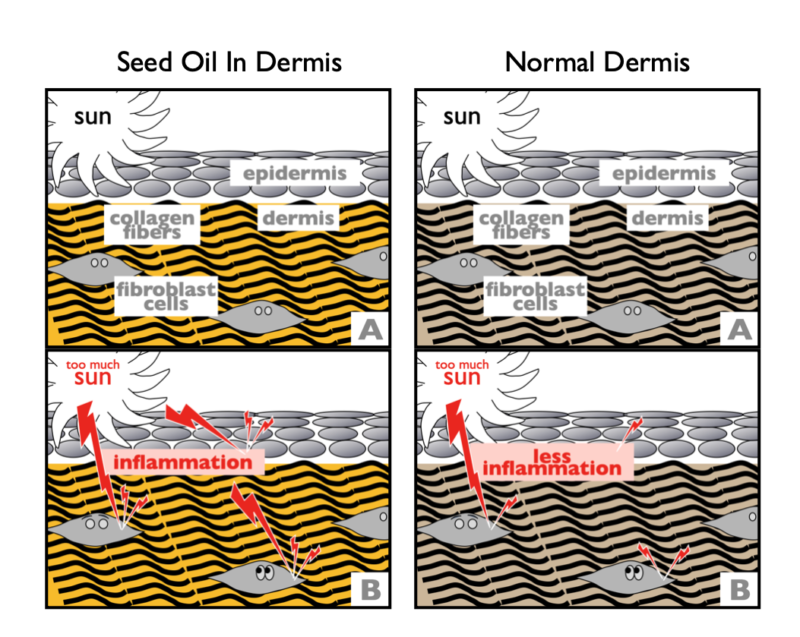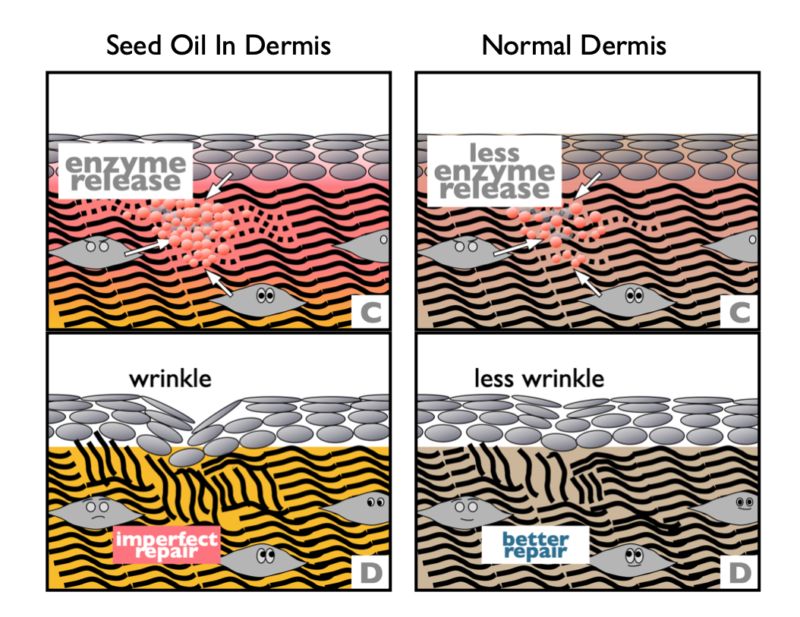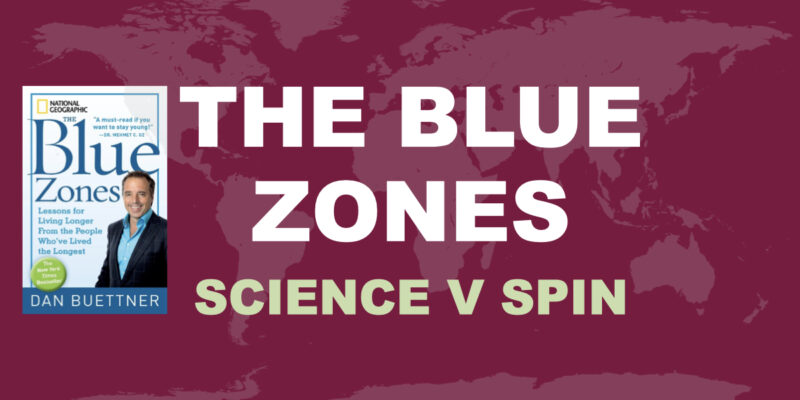The Blue Zones book has powerfully influenced medical thinking on nutrition. But the Blue Zones website and Adventist Healthcare system contradict the reality of people's diets that are presented in the book itself.

Seed Oil Makes Sunburn Worse and Ages Your Skin
Table of Contents
- How Seed Oil Makes Sunburn Worse
- Effects of Sun-Overexposure in Seed Oil Eaters versus Seed oil Avoiders
- Sunburns Can Damage Skin Collagen
- Sunburn-Related Inflammation Chews up Your Collagen
- Sunscreen is Never Going to Be As Good as a Natural Tan
- Does Omega-3 Supplementation Help Reduce Sunburns?
- Frequently Asked Questions
- How long do I need to be avoiding seed oils before I notice a difference in my skin?
- Do I have to avoid all seed oils?
- Where can I find seed oil-free foods?
- Is seed oil the same thing as vegetable oil?
- What constitutes a seed oil?
- Why isn’t olive oil a seed oil?
- What can I substitute for seed oil when baking?
- What else can I do to improve my skin health besides avoiding seed oils?
- Twitter Testimonials to the Skin-Protective, Sunburn-Minimizing Benefits of Seed Oil Avoidance
- Scientific References & Further reading
- Title: The Skin Epilipidome in Stress, Aging, and Inflammation
- Title: Mechanisms of UV-Induced Inflammation
- Title: Short-time UVA exposure to human keratinocytes instigated polyunsaturated fatty acid without inducing lipid peroxidation
- Title: Dietary Fish-Oil Supplementation in Humans Reduces UVB-Erythemal Sensitivity but Increases Epidermal Lipid Peroxidation
- Further Reading on PUFA and Oxidative Stress
How Seed Oil Makes Sunburn Worse
Everyone gets too much sun from time to time. But on a high seed-oil, low-nutrient diet, sun overexposure causes a lot more inflammation, which is painful, ages your skin, and may increase the risk of several types of skin cancers.
The images below are taken from a section of my book Deep Nutrition called “The Sun Can Damage Skin, But it Doesn’t Have to.” At the time I wrote that section in the book, we were so overly sun-phobic that doctors were waking up to the reality of massive vitamin D deficiencies. Children were getting rickets due to not getting any sun. The official solution proposed since that time has been to supplement with one of the several forms of vitamin D your body makes when exposed to the sun, usually D2 or D3. But there’s some reason to believe that we may benefit from all three forms.
Besides, the pleasure of feeling the actual sun on your skin is possibly also healthy. After all, just relaxing in the sun is nicer than relaxing in the shade, and therefore may better help to relieve stress.
This article is continued below...(scroll down)
Effects of Sun-Overexposure in Seed Oil Eaters versus Seed oil Avoiders
Seed Oil Eaters Experience More Inflammation

Let’s compare the sunburning processes in a seed oil eater shown on left to a seed oil avoider on a Deep Nutrition eating plan, shown on the right.
Seed oils are full of polyunsaturated fats (PUFA). These fats will end up under your skin. Looking first at panel A, above, we see the epidermis (dead cell layer) and dermis (collagen layer filled w cells). The seed oil eater (shown as yellow) has high PUFA content. The seed oil avoided (shown as Nabatean skin tone) has low PUFA content.
Now, looking at Panel B, above, we see the sun’s UV radiation striking the dermal layer, causing inflammation. We know that UV damages our skin. It does this by striking oxygen and forming dangerous free radicals (called singlet oxygen) that can attack PUFA in our cell membranes, and in the fat layer (not shown) below the dermis. The more PUFA, the more inflammation.
Singlet oxygen cannot attack saturated fat. In fact, saturated fat can put an end to any free radical cascades that may have started. For that reason, you can consider saturated fat a natural anti-inflammatory. Unfortunately, most people are afraid that saturated fat will clog their arteries and avoid it. Worse, government-funded nutrition programs are forbidden from including rich sources of saturated fat in their meal plans. They use seed oils instead.
Sunburns Can Damage Skin Collagen

Seed Oil Eaters Experience More Collagen Damage
Regardless of your skin color, your use of sunscreen, and your intentions to not fall asleep and bake past well-done on the beach, we all have our moments where we end up having overexposed ourselves to UV. Panel C, above, shows what happens to a seed oil eater versus a seed oil avoider after one of those moments.
In panel C we see that inflammation induced by UV stimulates fibroblasts to release enzymes (bubbles) that react to the inflammatory injury. These enzymes break down your skin’s collagen as part of the inflammatory response. The more inflammation you experience, the more enzyme gets released, and the more collagen gets damaged. Collagen makes or breaks how well you age. When your dermis has been doused in seed oils, you’re doomed to degenerate more of your precious, skin-supporting collagen. This brings us to panel D.
Panel D shows the after-effects of sun exposure on your collagen, showing how they differ depending if you’re a seed oil avoider or not. Most inflammatory responses in the skin trigger some degree of collagen degradation. The more seed oils in our skin, the more inflammation–and the more collagen degradation–you get. The body does this because usually inflammation means there’s an infection somewhere and chewing away the collagen enables the immune system to shove the invading bacteria out of our bodies. Once repairs are finished, the restored collagen fibers are less well aligned. Poorly aligned collagen is thus weaker, and prone to wrinkling compared to our original, more well-aligned collagen, and the effect is much worse in the seed-oil eater.
Back in the day, sunburns were relatively rare because we all lived more or less in geographical and latitudinal accordance with our skin color and ability to tan. We also were outdoors quite a bit more, and so naturally and gradually built up a base of color for the summer. But these days, we tend to binge on sun during those rare occasions when we can. So sunburns occur more often, and what was an adaptive response—those collagen chewing, pus-ejecting enzymes—becomes maladaptive. We can limit that maladaptive problem of modern sun-binging by purging those high PUFA seed oils from our diets.
The Sun Was Scary, in the 1990s
One reason we’re so sun-phobic is dermatologists. Well-meaning skin specialists have terrified us into believing one or two sunburns are all it takes and we’re going to get melanoma and probably die. Melanoma can strike us in our teens, and it’s the most dangerous form of skin cancer. For decades, dermatologists advocated the incessant use of suntan lotion to prevent skin cancer. But I’ve long thought those lotions are probably toxic or bad for our skin. That’s why, way back in 2008 I wrote that whole big section about using traditional foods to keep your skin healthy, and advocated for sensible sun exposure. What I mean by sensible sun exposure is simply slowly building up a natural tan. That’s the best possible method of getting your D and being able to enjoy the outdoors without relying on so much sunscreen.
Of course, going against the grain like that is basically asking to get massively criticized. That’s just human nature. One of the early reviews of Deep Nutrition went on the attack, “I’m a big believer in eating traditional foods but a lot of the ‘science’ in this book is anything but and in cases such as claiming eating traditional foods prevents sun damage to the skin, it is just plain dangerous.”
Sunscreen is Never Going to Be As Good as a Natural Tan
Reviews like that always make me think I should have explained myself better. I should have explained that most molecules that effectively trap UV just so happen to also be shaped to too easily slip between molecules of DNA and cause mutations. Although I suspected the suntan lotions were not good for our skin, at the time there was not much research to cite, so I didn’t mention it. But now, there is.
It turns out most of those lotions not only contain chemicals shown to be mildly carcinogenic, they’re also cytotoxic. The cytotoxicity explains why many people have reactions to sunscreens. So boo on the negative reviewer. And yay for all of us, because we now have more research showing sensible sun exposure has lots of benefits. Even, ironically, reducing melanoma risk. Getting a tan also blocks the deeper penetrating kind of UV light (UVA) that causes wrinkles. No sunscreen can do that, only sunblocks like zinc oxide can. But there again, we run into trouble relying on chemicals to protect us from the sun because chlorine plus UV plus zinc oxide forms a new compound, called zinc chloride—albeit highly diluted in the swimming pool. Still, as a writer for the new health cycle points out, zinc chloride “has its own hazardous substance fact sheet.”
Of course, we want to avoid burning our skin, as much as possible. And the best way to do that is to stop eating sun-sensitizing seed oils.
Does Omega-3 Supplementation Help Reduce Sunburns?
If you’re someone who is considering omega-3 supplementation to reduce inflammation, that might help if you’re malnourished. If you’re not a big protein eater, if you don’t eat seafood, fish, nuts, or grass-fed dairy, then omega-3 supplementation may help. But otherwise, it’s not likely to work. This is true because singlet oxygen attacks all PUFA. Indeed, omega-3 is more easily destroyed by these attacks and is the first to go. So if you are a seed oil eater you will, unfortunately, experience more inflammation than your ‘crazy’ friend who won’t eat McDonald’s fries with you anymore. This holds even if you’re supplementing with omega-3.
The Root Cause of Inflammation is Oxidation, Not Omega-6
Seed oils are higher in omega-6 than omega-3. One popular idea floating around the web is this idea that omega-6 to 3 ratio imbalances are the root of the inflammatory problem. This is based on the belief that most inflammation is driven by anti- and pro-inflammatory eicosanoids. But as someone who has been studying this topic for over 2 decades, I believe most inflammation is driven by oxidative stress.
The eicosanoid mediators are different from the fatty acids in seed oils. The fatty acids in seed oils need to be chemically modified before participating in these pathways. This process is enzyme-driven, as is their subsequent conversion into inflammatory and anti-inflammatory eicosanoids. Our bodies tightly regulate enzymes, both their production and activation. In other words, seed oils don’t contain inflammatory eicosanoids. They contain precursors to precursors to precursors of inflammatory eicosanoids. So omega-6 to 3 imbalances have only a limited effect.
Seed oils are so toxic chiefly because they cause oxidative stress in our bodies, and oxidative stress, in turn, drives our inflammatory responses. It also has many other negative effects.
Frequently Asked Questions
How long do I need to be avoiding seed oils before I notice a difference in my skin?
The oils actually stay in your body fat for years after you stop eating them, but for a variety of reasons, we experience many benefits long before they’re all gone.
Most people living in climates where they’re outdoors mostly in summer say that from one year to the next they notice a big difference.
Those living in constantly sunny climates say six months.
Do I have to avoid all seed oils?
The more diligent of a seed oil avoided you become, the more benefits you get. Most folks just swapping out home cooking oils but living a normal life otherwise do get some benefits. But nowhere near what you have waiting for you once you commit to reading labels and being that special person in your group of friends. Celebrity Dr. Drew Pinsky who has generously invited me onto his shows several times is now a full-on seed-oil avoider. But he was in that first group for several years before deciding to commit. He puts it into stark perspective this way, “If you had told me that two weeks into it I would feel this good, I wouldn’t have believed you.”
Where can I find seed oil-free foods?
I created a handy dandy list for you right here.
Is seed oil the same thing as vegetable oil?
Yes and no. The terms are confusing and I believe that’s intentional so that people think there’s no clear answer and just give up the whole endeavor. Don’t fall into that trap, the answer is clear, but it takes quite a lot of technical chemistry and insights into refining, human metabolism, physiology, yadda, yadda. Please see my reply to the next frequently asked question for the list of 8 oils that you want to avoid.
What constitutes a seed oil?
That depends on who you ask. There are many more voices in the seed-oils-are-toxic conversation than there were when I first started talking about their toxicity over 20 years ago now, which is gratifying. Still, it’s a highly technical subject so I’d recommend asking me. LOL. My list contains 8, which I call the Hateful 8. There are 3Cs: Corn, Canola, and Cottonseed. 3Ss: Soy, Sunflower, Safflower. And 2 mostly in restaurants: Ricebran, and Grapeseed. More info on these 8 toxic oils here.
Why isn’t olive oil a seed oil?
Olive oil is technically a fruit oil because it’s made from the pulp of the olive, not the seed.
What can I substitute for seed oil when baking?
I answer that here.
What else can I do to improve my skin health besides avoiding seed oils?
I thought you’d never ask. My first book, Deep Nutrition, gives you a complete picture of a healthy human diet. Folks call it the nutrition bible. Please help me continue my work by considering buying yourself a copy. I *deeply* appreciate your support!
Please visit HERE and HERE for more FAQs!
Twitter Testimonials to the Skin-Protective, Sunburn-Minimizing Benefits of Seed Oil Avoidance
(Click here to join the conversation!)
@Noor9241
There is a vast difference with my skin since last year. I was eating seed oils and went to Puerto Rico. My skin had bumps that fried spring rolls have. Literally being fried by the Caribbean sun. This year with no seed oils, I have a beautiful tan. No burning or frying.
@Cori__P
Not something I *sell* to others but I haven’t had a sunburn since going animal-based over 4 years ago. Regardless of how much time I haven’t been in the sun autumn–>spring, I won’t burn. Most of those oils aggravate my stomach and skin so compliance isn’t really a choice.
@firstgentrekkie
I used to sunburn every summer. Now I walk for an hour or more each day & have a nice light tan, no burning. I credited cutting sugar & starch, but certainly the quality of fats in my diet can be a factor, too.
@mwjeepster1
I haven’t consumed seed oils in years. I used to burn up in 15 minutes, but now, I’m out in the sun all day, no burns – just a great tan!
@yawnenthusiast
In my experience, after three months of complete elimination, you’ll have noticeably softer skin, reduced blemishes, and sun “burns” don’t feel tight and are much less painful when showering. After six months, no burns, right to tan.
Scientific References & Further reading
Title: The Skin Epilipidome in Stress, Aging, and Inflammation
Key Segment:
“ The long-wavelength UVA (320–400 nm) oxidizes lipids in absence of enzymes but also shorter wavelength radiation can non-enzymatically generate oxidized lipids via free radical mechanisms. Cholesterol, phospholipids, free fatty acids, and squalene are targets for non-enzymatic lipid oxidation and yield bioactive products. Enzymatic synthesis of oxidized lipids, most prominently eicosanoids and related oxidized polyunsaturated fatty acids (PUFAs) results from UV activation of phospholipases, lipoxygenases and cyclooxygenases. Most of the work on enzymatic generation of eicosanoids has been done on the response to clinically relevant short wavelength UVB irradiation. This may lead to an underestimation of non-enzymatic effects to solar UV exposure which are mostly elicited by longer wavelength radiation. “
Title: Mechanisms of UV-Induced Inflammation
Key Segment
“Oxygen radical-induced peroxidation of membrane lipids caused by irradiation may contribute to increased phospholipase activity. Oxygen-free radicals also participate in sunburn cell formation and in UV-induced decreases in Langerhans cell numbers. Several enzymatic and non-enzymatic mechanisms are present in skin for reducing these highly reactive oxygen species.”
Title: Short-time UVA exposure to human keratinocytes instigated polyunsaturated fatty acid without inducing lipid peroxidation
Key Segment
“short-term UVA exposure to HaCaT cells appears not as deleterious as anticipated. HaCaT cells may have a certain level of defense mechanism, e.g. elevation of DHA when exposed to UVA thereby assisting them to recover from potential damage. Nonetheless, in our study, UVA received from 1 h duration of sunlight exposure can modify PUFA composition and its metabolism in skin cells. However, the effect on extensive exposure requires elucidation as it may be detrimental and pose a risk to skin health”
The short term in this study was 15 minutes. Minimal effects are seen, as they say, but all effects seen are mediated by PUFA oxidation. Longer term was 1 hour. Significant delterroius effects are seen.
Title: Dietary Fish-Oil Supplementation in Humans Reduces UVB-Erythemal Sensitivity but Increases Epidermal Lipid Peroxidation
Key Segment
“Hence dietary w-3 fatty acids produce a pronounced reduction in UVB-erythemal sensitivity, although susceptibility of skin to lipid peroxidation is increased.” This makes sense because the increased omega3 blunts the vasodilatory response but at the same time increases lipid peroxidation, which is more damaging than increased blood flow. In the next sentence, they hypothesize that:
“Thus, ?-3 fatty acids may act as an oxidizable buffer, protecting more vital structures from free radical damage.” This is not likely and actually contradicts their own findings of increased lipid peroxidation.
According to a PUFA researcher I’ve spoken with, authors are pressured to find something positive to say about omega-3 or they won’t get published!
Further Reading on PUFA and Oxidative Stress
https://drcate.com/pufa-project/#mechanism-oxidative-stress
Photo of Sunburned Skin Image Credit: Photo by Kajetan Sumila on Unsplash
Please note: Please do not share personal medical information in a comment on our posts. It will be deleted due to HIPAA regulations.
This Post Has 2 Comments
Note: Please do not share personal information with a medical question in our comment section. Comments containing this content will be deleted due to HIPAA regulations.



















I’ve always been adverse to sunscreen for many of the reasons you’ve explained above. But now I’m reevaluating my skincare choices as well… most include some of the hateful 8 oils (sunflower, safflower especially). It’s hard to find a quality product that doesn’t. What’s your take on using skincare products that contain these?? Lotions and moisturizers absorb into the skin so thinking no..?? But that’s difficult to grasp that all products are off limits.
Yes, a good question and one I have yet to dedicate a post to, after all these years.
Bottom line is it’s not absorbed into your body, so won’t have so harmful effects anywhere but your skin. And since your skin is right there where you can see it, you can tell if it’s harming your skin or not. If it looks fine, don’t worry.
Hope that helps!